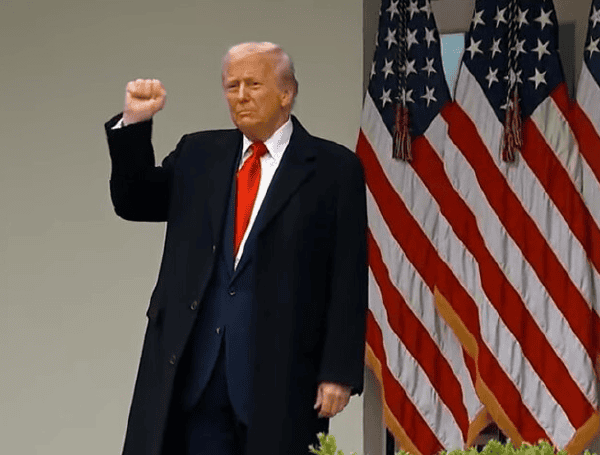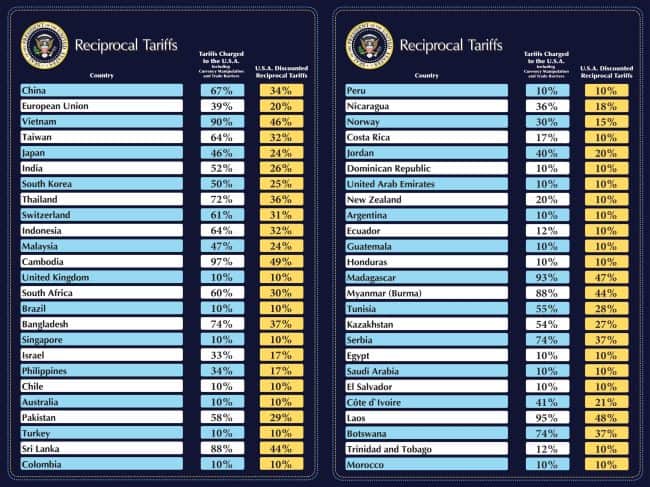Declaring April 2 as “Liberation Day,” President Donald J. Trump unveiled a sweeping package of new tariffs in a fiery Rose Garden address, launching what the White House is calling the “Make America Wealthy Again” initiative.
The announcement marks one of the most aggressive moves yet in Trump’s campaign to overhaul U.S. trade policy and revive American industry.
READ: Florida Gov. DeSantis Rips Into Rep-Elect Randy Fine After Special Election Win
“Today is the day America reclaims its destiny,” Trump proclaimed before signing a historic executive order instituting reciprocal tariffs on dozens of countries. “This is our declaration of economic independence.”
The centerpiece of the new trade policy includes a baseline 10% tariff on all imports, effective April 5, with steeper levies on countries deemed to be unfair trade partners. Notably, a 25% tariff on all foreign-made automobiles will go into effect at midnight.
“We will charge them approximately half of what they are and have been charging us,” Trump said. “That includes tariffs, non-monetary barriers, currency manipulation, and other forms of cheating.”
READ: Texas Sen. Ted Cruz, Minnesota Sen. Klobuchar Clash Over Judges’ Repeated Attempts To Stop Trump
Countries impacted by the new measures include major trading partners such as China, India, Japan, Vietnam, the European Union, and even traditional allies like Australia and South Korea. Trump specifically called out Australia for banning American beef while exporting over $3 billion of their own to the U.S.
“For decades, our country has been looted and plundered by nations near and far,” Trump said. “Our steelworkers, autoworkers, farmers and craftsmen suffered gravely as foreign cheaters ransacked our factories and tore apart the American Dream.”
Trump argued that decades of weak leadership had allowed the U.S. to become dependent on foreign markets and vulnerable to economic manipulation, including unfair VAT taxes, export subsidies, and environmental “pollution havens.”
Holding up the U.S. Trade Representative’s report on foreign trade barriers, Trump said, “It’s very upsetting when you see what people have been doing to us for 30 years. This all happened with no response from the United States — until now.”
READ: Florida Sen. Rick Scott Eyes Blocking U.S. Gov Contracts With Maduro Regime Supporters
The president connected the trade imbalances to national security risks and industrial decline, citing the low market penetration of American auto companies abroad.
“81% of cars in South Korea are made in South Korea. 94% of cars in Japan are made in Japan,” Trump noted. “Toyota sells a million cars here. GM and Ford sell almost none there.”
Trump emphasized that the goal is not isolation but fairness, insisting that his plan would lead to lower taxes, reduced national debt, and a resurgent industrial base.
“Jobs and factories will come roaring back,” Trump said. “We will supercharge our domestic industrial base. This is the dawn of the Golden Age of America.”
The announcement signals a seismic shift in U.S. trade doctrine, away from decades of multilateralism and globalization toward aggressive bilateral reciprocity.
Trump’s move also carries political weight, reinforcing his “America First” platform ahead of the 2026 midterm elections and rallying a core voter base in manufacturing and industrial communities.
Please make a small donation to the Tampa Free Press to help sustain independent journalism. Your contribution enables us to continue delivering high-quality, local, and national news coverage.
Connect with us: Follow the Tampa Free Press on Facebook and Twitter for breaking news and updates.
Sign up: Subscribe to our free newsletter for a curated selection of top stories delivered straight to your inbox.

